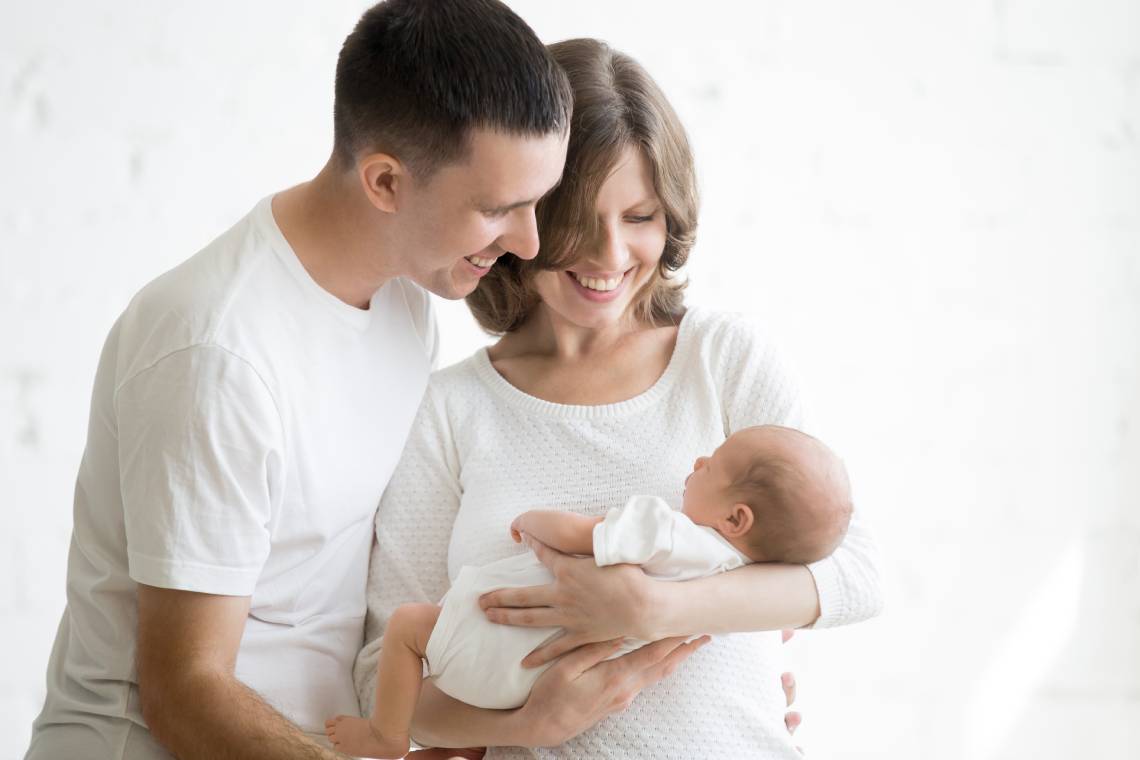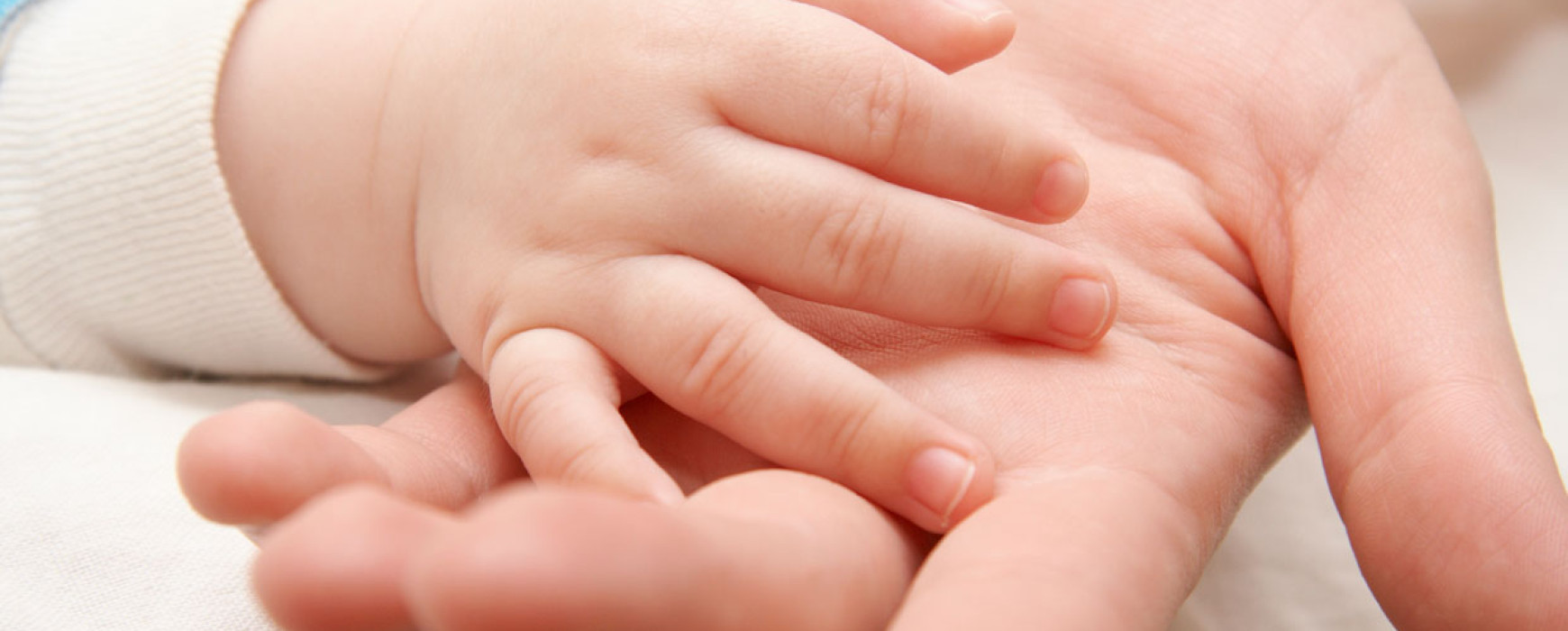Patient Story- Lauren
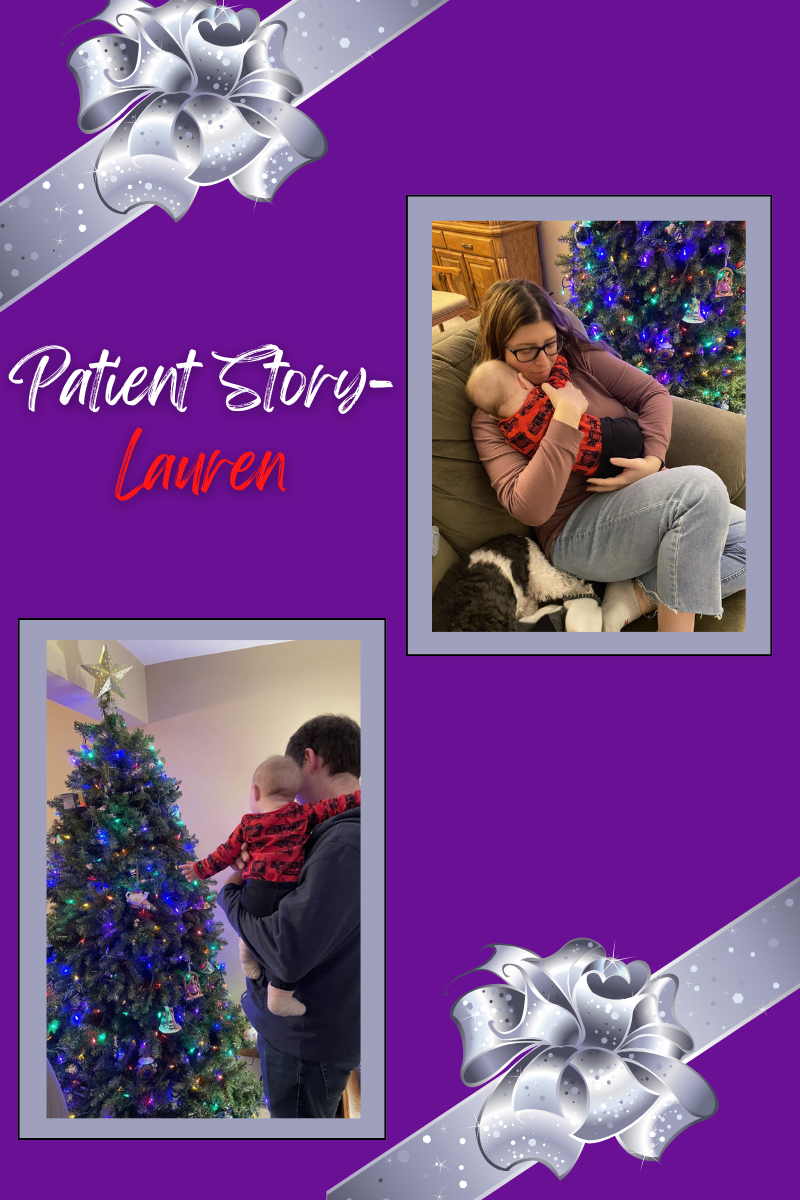
“Now, I look at my daughter and have to pinch myself. I can’t believe she’s here!”
We know the holidays can be a challenging time for many of our patients. However, today we want to share Lauren’s story with you. This time last year, Lauren wondered if she would ever become a mother. Today, she has a beautiful baby girl. Unhappy with her previous clinic, Lauren came to Dr. Miller. He listened to her concerns and together they came up with a treatment plan. Another example of how important it is to advocate for yourself when it comes to your health.
Lauren writes:
My story is one of finding hope with Dr. Miller and with the wonderful staff at the Advanced IVF Institute. My husband and I had been through a lot by the time I made a teary phone call to the receptionist (or angel?) at Dr. Miller’s office. We had been years-long patients elsewhere, and had experienced four failed IUIs and two rounds of IVF yielding only one embryo and subsequent miscarriage. We were tired, sad, and wondering if becoming parents was achievable. Our previous doctor told us we would be “lucky” to end up with one child, and suggested egg donation. After researching different fertility specialists online and comparing SART statistics, I knew Dr. Miller would be the best choice for us.
When we met with Dr. Miller, he had a thorough knowledge of our history, a plan, and compassion for what we had been through. I have PCOS and thyroid disease and felt that my previous clinic did not take this into account when creating my treatment plan.
Dr. Miller took my concerns seriously and addressed them. I had concerns about insulin resistance, he investigated it and treated it. I had concerns that my previous clinic did not take my thyroid disease seriously enough and allow for appropriate monitoring, he agreed and made sure my levels were optimal before proceeding. My husband was concerned about his inconsistent fertility testing, Dr. Miller confirmed that we were dealing with an element of male factor infertility.
After our first meeting, I distinctly remember him saying, “I might not get it the first time around, but I’m confident we will get you on the right treatment plan.” Well, he did get it the first time around. Imagine our surprise and delight when on our first round with Dr. Miller we ended up with five beautiful embryos, and a pregnancy on our first transfer. He and his staff celebrated with me each week when things were going well in my early pregnancy, and by the time I “graduated” these people felt like family.
Today, we have a beautiful baby. When recovering in the hospital, my husband asked me if I thought Dr. Miller knew how much he changed our lives. When we had no hope left, he gave us everything. I think about this time last year, and not in my wildest dreams did I think I would be where I am today. I spent six years of Christmases thinking “Next year will be my year.” Now, I look at my daughter and have to pinch myself. I can’t believe she’s here!
My advice to those going through this is to live while you’re waiting. It’s tempting to throw everything you have into the process when you’re going through it. One month off from treatment to take a vacation or celebrate something special is good for your mind and body- don’t forget to nurture yourself.
Patient Story- Sheri
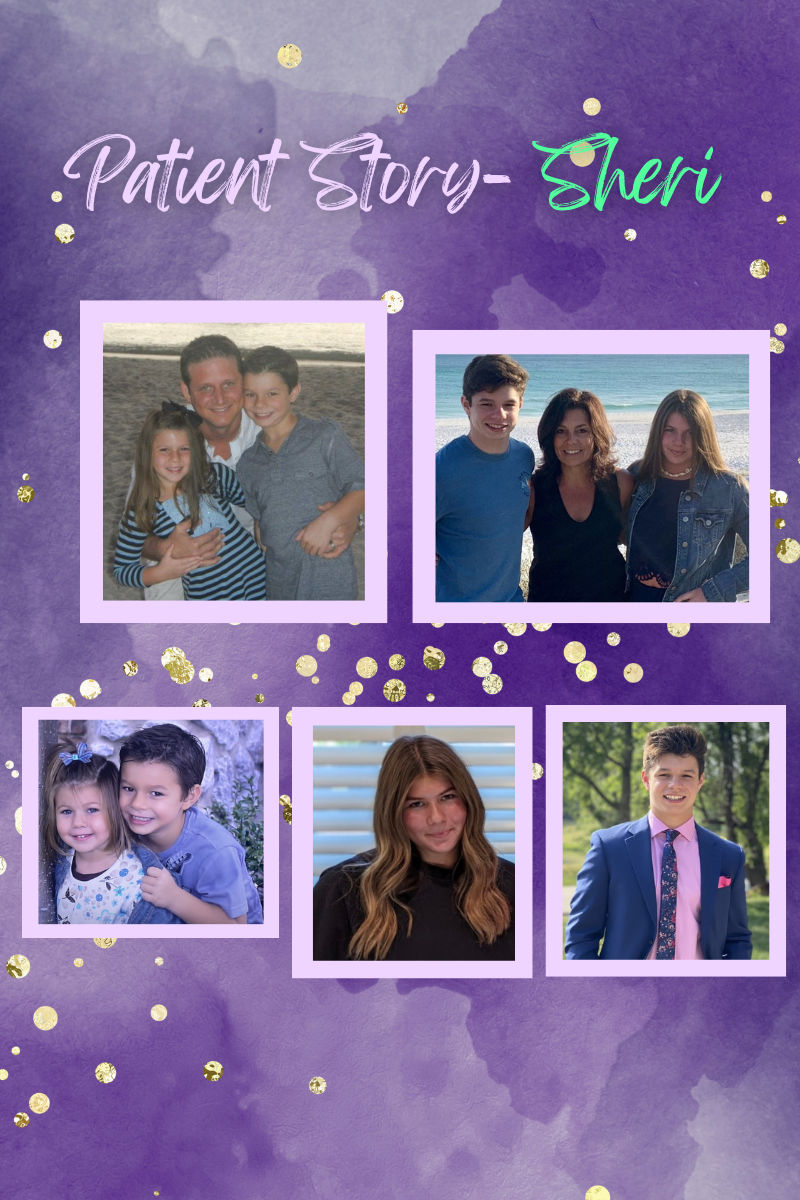
“We have been very blessed with great kids who seem to appreciate life, maybe because somehow, subconsciously they know that it took that extra little miracle to be here.”
Up until now, our patient stories have featured women who have recently become mothers. However, today’s submission is from Sheri, who first became a patient 20 years ago! Technology has advanced over the years, but the overarching message from Dr. Miller remains the same: “trust the process.”
My story begins many years ago (my two miracle babies are now 19 and 16)!
After years of trying to conceive, being on countless fertility drugs, endless testing and 5 years of monthly disappointing moments we decided it was time to take the next infertility step and meet Dr. Miller. My husband and I immediately felt confident he was the answer to our unexplained infertility. We left with a sense of relief. He looked us right in the eye and said “trust the process.” It was Dr. Miller’s confidence and stellar reputation that made us say “When can we start!”
The process, although long and hard at times was, by far, made less grueling and easier to face because of Dr. Miller and his staff. Every single person we encountered was kind, sympathetic, positive, caring and made us feel like they were our “infertility family”. There was one person in particular who will always stand out and be a part of my heart and that was Lynne who was at the front desk. Her smile when I walked in put me at ease instantly.
Infertility is praying endlessly. It’s sad, depressing, hard, lonely and you shed many tears. There are many roadblocks and setbacks but this journey with Dr. Miller was worth every single minute.
We were very fortunate that our first round of IVF gave us our son and our second round gave us our daughter.
Both of those IVF cycles began as multiple pregnancies but by some miracle our son and our daughter held on when we experienced vanishing embryos. It was terrifying to think we were losing the babies. I remember the moment when we thought we were miscarrying. Dr. Miller was in Europe and he called personally to ease our fears and tell me what to do to give the other baby the best chance. Grief hit hard knowing our multiples were now single pregnancies. I still think of what would have been had that not happened but take a moment to remember them and even though we never met them we love them always for what little time they were ours.
A year after our daughter was born we kept trying for more children without success. Time was not on my side because of my age. Dr. Miller saw me struggling mentally and finally gave me the strength to walk away and enjoy the 2 miracles we were blessed with.
Our son, Nick, is now 19 and studying engineering at Purdue and our daughter, Emily, is 16 and thriving in high school. Every moment of their lives has been better than the next. We have been very blessed with great kids who seem to appreciate life, maybe because somehow, subconsciously they know that it took that extra little miracle to be here.
To all the patients present and future…I pray for you, I wish you peace always and I hope your dreams come true. You deserve to be parents!
Patient Story- Breda
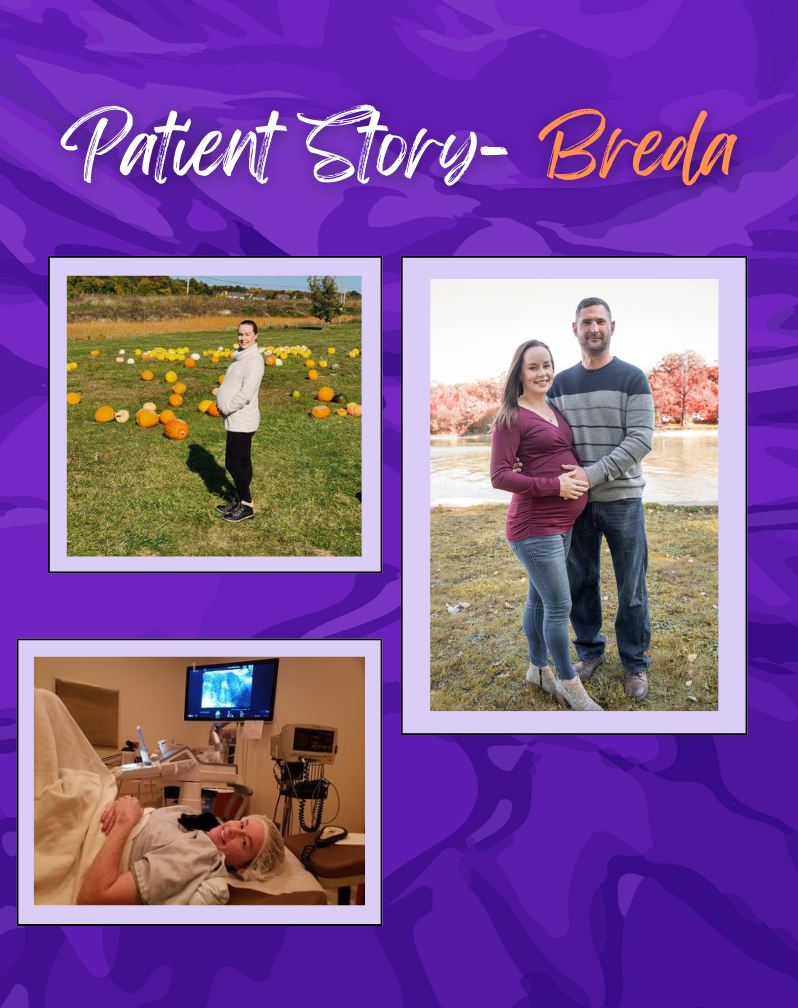
“Not everyone will understand IVF or be able to relate, so it’s important to surround yourself with support. More people than you realize struggle with infertility.”
Today’s patient story is from Breda. After not finding success or feeling comfortable at another fertility clinic, Breda came to us. We are all glad she did! Dr. Miller was able to diagnose her with endometriosis and after surgery and IVF, she was able to get pregnant. Breda is due in January!
Breda writes:
I met my husband later in life and we got married when I was 38. I was and still am wary of the stigma of older mothers, even though being older is accepted. I’ve always wanted a family and we started trying right away, but I had three miscarriages in a year and a half. I was at a different fertility clinic for a year, but didn’t feel comfortable there. My husband’s colleague recommended we see Dr. Miller and what a difference!
We first met online during COVID and Dr. Miller told us, “You’ll be a mother, kiddo.” He was so kind, didn’t rush us, and he explained everything. He learned I was an English teacher and told me a story that put me at ease. He never stopped his storytelling, and I welcomed his personable demeanor after some bad experiences at the previous clinic. Dr. Miller found issues that the previous doctor did not, including endometriosis.
After a biopsy, Dr. Miller found abnormalities in my uterus and I was diagnosed with Level 1 endometriosis. During surgery, he removed five spots on my uterus. I also had the Endometrial Receptivity Assay biopsy to determine the receptivity of the uterus to implantation. Soon after, we had an egg retrieval and two transfers.
Throughout this process, Dr. Miller and his staff explained everything so thoroughly and never seemed irritated or disinterested when I had questions. I also got to know Dr. Miller and the nurses because they talked to me during appointments. I always felt people cared and were invested in our success. I felt so secure going into our procedures and never felt anxiety or stress visiting the office.
Even though our first transfer failed, a second embryo implanted and I will never forget that experience. Dr. Miller, Courtney, and Melody were present for the transfer, and made me feel so comfortable. Dr. Miller even told us a funny story about meeting an actor from Will & Grace. While we waited after the transfer, my husband and I held hands and prayed, and we also talked about how wonderful it would be if it worked. Many times, we dreamed of finishing our nursery and being able to move forward with our plan. The transfer worked, and our baby is due January 8, 3.5 years after we began IVF and what seems like a million doctor appointments.
I was very nervous the first 12 weeks of my pregnancy and braced myself for bad news, but at every ultrasound Courtney reassured me with her positivity. We are so grateful for everyone at the Naperville office.
It took until I was about 20 weeks pregnant for me to relax and realize we’re finally going to be parents! I’ve cried many happy tears for a change! Not everyone will understand IVF or be able to relate, so it’s important to surround yourself with support. More people than you realize struggle with infertility. Meditation and journaling are helpful (as well as long walks with our dog, my first baby). Finally, never stop hoping and praying, even if you’re an older mother!
Patient Story- Molly
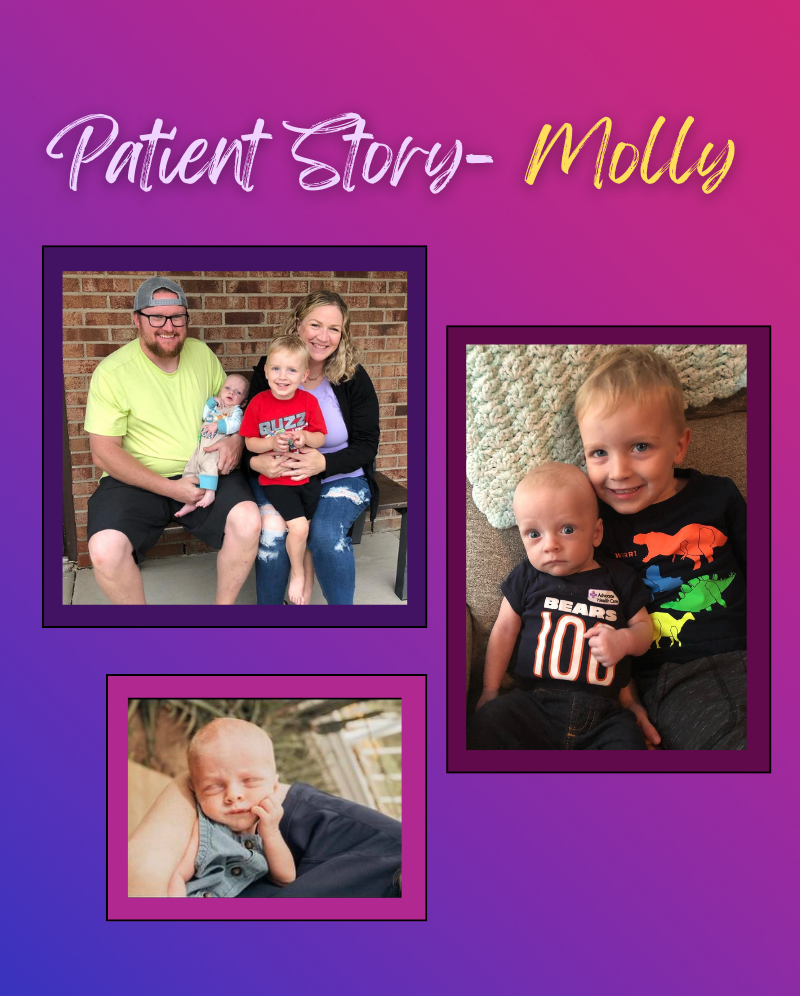
“We have been so blessed that I know all the pain and suffering we endured was worth it.”
We’re featuring Molly’s story today! Molly’s story is unique because she was diagnosed with unexplained infertility. This is a tricky diagnosis, because even after testing a cause cannot be determined. When this is the case, there is a lot of trial and error in order to achieve pregnancy. But as Dr. Miller always says: “Trust the process.” That’s just what Molly did and now she has two beautiful sons. Read her story below.
I first became a patient of Dr. Miller’s in 2012 when I had a myomectomy, a surgical procedure to remove uterine fibroids. After getting married and trying for several months to get pregnant, a co-worker suggested I see Dr. Miller, but this time as a fertility specialist. At our first appointment, Dr. Miller ordered blood work and a hysterosonogram which is an ultrasound exam that provides images of the inside of the uterus to help diagnose the cause of abnormal vaginal bleeding. However, everything came back fine. I was told I had unexplained fertility. This wasn’t the news I wanted to hear! It would have been easier to have a specific reason for why I could not get pregnant.
I was put on medication for thyroid and prolactin issues. After a month on the medication, it was advised we try an IUI. We failed all three attempts. Dr. Miller said IVF would need to be our next step. Soon after, my retrieval resulted in 26 eggs! My husband and I were so excited, our dream of having a baby was one step closer.
However, we were unable to do a fresh transfer at that time because I was borderline for Ovarian Hyperstimulation Syndrome (OHSS). This occurs when a woman’s ovaries swell and leak fluid into the body. This condition is temporary and occurs in less than 5% of women who receive fertility treatments. Instead, we ended up freezing 8 embryos. About two months later one embryo was successfully transferred. It was a strange feeling, because I was so happy and terrified at the same time.
After graduating from Dr. Miller’s office, my OB/GYN monitored me closely and that little embryo was born at 34 weeks gestation. Again, I was happy and terrified at the same time. Thankfully our little boy was healthy and strong.
After our son turned 18 months, we decided to start the process to have another child. We decided to follow the same protocol as before and do a transfer in three months. Unfortunately, it failed. After meeting with Dr. Miller again, he advised us to do a trial cycle with an Endometrial Biopsy (EMB). An EMB tests whether the uterine lining is preparing itself adequately for implantation of the embryo. If the lining is out of phase, it can prevent implantation from occurring or result in an early miscarriage. Because the results of my EMB were abnormal, I was treated with progesterone. The following month we had another transfer and it was successful! We welcomed our second baby boy this June./p>
Our two little boys are thriving! We are so happy we found Dr. Miller and are so grateful for everyone in the office as well as Dr. Deutch who did our last transfer. Our advice to other couples going through infertility is to know that you are strong, brave and deserve to be parents. Don’t ever give up! We have been so blessed that I know all the pain and suffering we endured was worth it.
Patient Story- Rachael
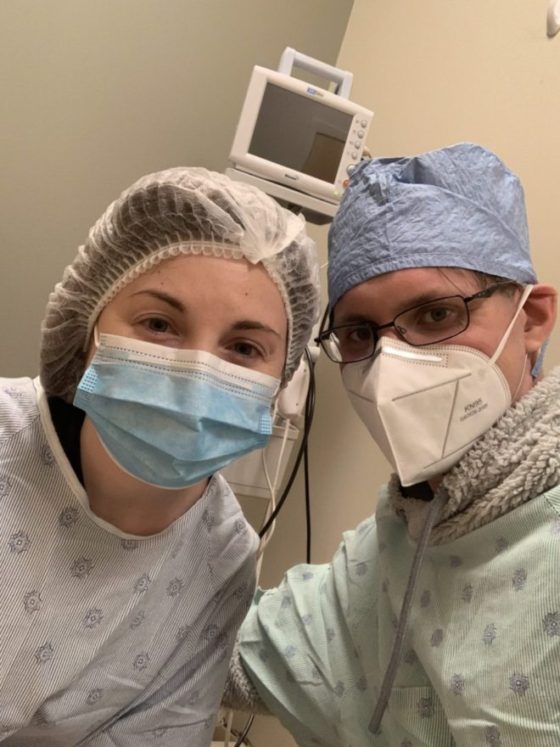
“Our plan was always to have a baby, but our path certainly wasn’t a straight line.”
Our next patient story is from Rachael. Rachael’s journey to motherhood has not been an easy one. After undergoing several unsuccessful rounds of IVF, Dr. Miller advised Rachel to consider using an egg donor. In her story, Rachel describes the process she and her husband went through to choose an egg donor and what advice they would give to others in her situation. Rachael’s story has a happy ending- she is now pregnant and due with a baby boy in February!
Rachael writes:
To say that our journey was a difficult one is an understatement.
I was 34 years old when we wanted to start our family. After six months of trying on our own, we met with Dr. Miller. Testing and medication followed, and we eventually discovered – after finding out I had a diminished ovarian reserve, as well as confirming that I had a unicornuate uterus – that IVF was a route we needed to take. We diligently went to work ordering medication, setting up appointments, and saying so many prayers. Unfortunately, our first round failed. We just kept thinking, “This is it!” only to find ourselves back at square one.
When I met with Dr. Miller for our follow-up consult, he had another plan to try again. Upon leaving our meeting, he told me, “Stick with me, Rach! Rome wasn’t built in a day.” Knowing this was true, and knowing we had faith in our doctor, we trudged ahead and kept going. What followed were an additional five rounds (some stopped before retrieval), further testing and added medication, laparoscopic surgery, and the need to put on more weight in hopes that it would help my egg quality.
After several additional rounds of IVF and additional embryos from said rounds that didn’t take, our insurance plan was running out of options for us to keep moving forward. Dr. Miller advised us not to do the egg retrieval with my own eggs at that point and suggested turning to an egg donor. We were absolutely heartbroken. We knew that this was a real possibility, but the news was hard to take in. We were at the end of stimulation injections, and my body just wasn’t cooperating (which had happened during another of our previous cycles). Knowing my track record, Dr. Miller was concerned that this round would not work and then we’d really be out of options with my insurance. We converted the round to an IUI, but it didn’t take. A month later we transferred the one frozen embryo we had (insurance would still cover that), but we were left with a negative result.
We were angry, frustrated, and beyond depressed. We knew it was no one’s fault (I had to keep reminding myself that I did nothing wrong), but we couldn’t understand why it was happening. We did absolutely everything we possibly could to have a positive outcome, but were left with nothing but grief. You know everyone means well when they offer their condolences, but there are times when IVF is an incredibly isolating experience.
A few months later, we met with Dr. Miller again to discuss using an egg donor. He answered all our questions and felt optimistic about this new plan. When we were ready, we contacted an agency to get information. Later that fall, we chose our egg donor and started to feel more optimistic ourselves. Our donor went through the testing process and started some medication. We had psychological evaluations to make sure that everyone was in the right state of mind to go through this process, and we met with a lawyer to go through the contingencies of everything.
Our donor finally had her egg retrieval in February; we received 48 eggs (which was incredible!), and out of the 48, we had 17 embryos to freeze. We couldn’t quite sync up cycles, so we worked toward an April transfer, but then that got canceled due to me catching COVID-19. We were finally able to complete our transfer in May, and at the end of the month we received our first positive pregnancy test! I’m due in early February with a boy and am currently 18 weeks along (for a frame of reference, I am now 39 years old).
Moving forward, we have 16 embryos at our disposal. Besides some days where I didn’t feel great in the first trimester, my energy has bounced back in the second trimester and I feel pretty good! We’re really looking forward to the future and still cannot believe that we’re on the other side after years of wondering “what if?”
It was a long, difficult four-and-a-half years to get to this point. There were so many tears, early morning appointments, and hours upon hours of frustrating phone calls with insurance and pharmaceutical companies. There were so many pregnancy announcements by friends and family. There were so many times when we felt raw, numb, and alone. But on the other hand, we had hope. We had a strong support system, and we had a caring doctor who genuinely wanted the best for us. Dr. Miller’s staff was so kind and offered me hugs on more than one occasion when we received bad news. We learned to give into the unknown (something difficult for us teachers to do) and trust that we were doing everything we could.
If I can offer advice, I’d stress the importance of learning to pivot. Our plan was always to have a baby, but our path certainly wasn’t a straight line. We had to adjust the details of our dream, but that doesn’t mean that we’ll be any less of parents than we would have if things had worked with my genetics. Our dream could still be a reality, but adjustments were needed. Keep the end goal in mind: if it’s to have a child, understand that what that means might look different than what you anticipated when you started the journey.
If you find yourself in need of an egg donor (or sperm donor, if that’s the issue), I’d encourage you to take your time and go through the process when you’re ready. Don’t try to look for yourself in the pool of applicants; you won’t be there, and that’s okay. When we first got information from the egg donor agency, they encouraged us to not pay as much attention to pictures, but to focus on the information: we examined their health history and that of their relatives; we listened to their reasons for being a donor; we screened applications for the possibility of twins and triplets (given my unicornuate uterus, multiple births at one time was not considered a viable option); we also poured over their previous donor cycles to see what kind of success they had.
In the end, we chose someone who looked happy. She genuinely wanted to help other people conceive and assisted others in that goal already. The agency (and Dr. Miller’s office) couldn’t say enough good things about her, which was really reassuring. Besides matching my ethnicity, she does not look like me, but I’m keeping in mind that our boy very well may look more like my husband than the donor. If he doesn’t, that’s okay, too. This was something I had to learn to get comfortable with before we officially went through the donation process.
There are times when I look back at the last few years and the pain comes crashing back, and I’d be lying if I said it was easy to move on from my genetics. However, at the end of the day, the goal is to have a baby, and I learned that it is still possible if my genetics are no longer an option. This could be a path for you, too.
We would also encourage you to let people in and have a support network. My husband and I did not always want to talk about our struggles, but knowing we could speak with family and friends was helpful (and there are other support groups if you aren’t getting the support you need from those around you, too). Even though most of the people you know might not “get” the struggle you’re going through, it’s important to remember how many people are in your corner. You’re going to feel alone. You’re not.
Keep the faith. We’re rooting for you!
Patient Story- Courtney
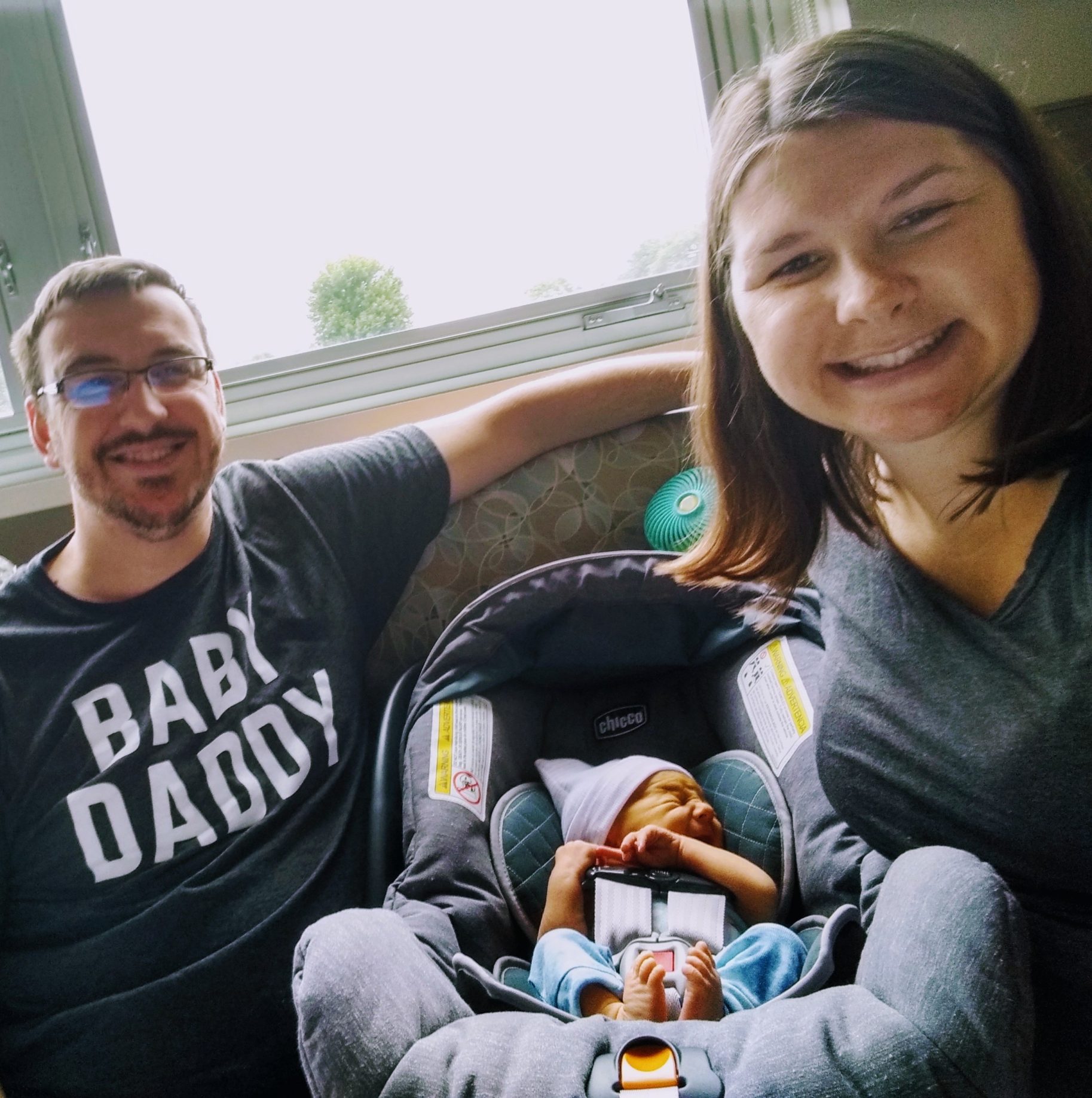
“Keep going even when it feels like you can’t… The little victories will give you strength.”
Today’s patient story is from Courtney. Courtney discovered she had endometriosis when she and her husband were not able to conceive naturally after several months of trying. After undergoing surgery with Dr. Miller, she was able to get pregnant via IVF and just welcomed a baby boy only three weeks ago! Congratulations Courtney!
Courtney writes:
My husband and I began trying to conceive in late 2017. While at my yearly gyno appointment in May 2018, I mentioned we were trying to conceive. I was told to track ovulation with an app and/or pee sticks and go from there. My period had always been like clockwork and I learned that my ovulation was too. I maybe had heavier/more painful periods but nothing that ibuprofen and a heating pad couldn’t fix. My gynecologist did an internal ultrasound and noticed that one ovary was dense, leading her to believe that I might not ovulate on that side, however my pee sticks indicated that I did.
We ended up getting pregnant on our own in the summer of 2019, but that ended in a miscarriage (D&C) as there was nothing in the sac. I then had the dye test to see if my tubes were blocked and they were not. I also did 3 rounds of clomid with no pregnancy. This was the end of the road with my regular gynecologist as she couldn’t help me any further.
I then went to another gynecologist in my hometown to move onto IUIs. He did a natural IUI with no luck. Then we tried a medicated (clomid) IUI with no luck either. During this process, he did an internal ultrasound and that’s when I first learned I possibly had endometriosis. He referred me to Dr Miller.
I had laparoscopic surgery with Dr. Miller in Feb 2021 for endometriosis. We decided to try surgery before an egg retrieval, because Dr. Miller thought he could clean me out and then we could try to conceive naturally or with clomid as he didn’t think the endometriosis was as bad as it turned out to be. However, during surgery he found stage 4 endometriosis on my ovaries and appendix. He removed my appendix and did what he could on my ovaries in order to preserve them for IVF.
After my surgery, Dr Miller said that the endometriosis had been there for quite awhile because the cysts were so fixed to my ovaries. He said he did what he could to minimize the cysts but he couldn’t get rid of them fully because that would ruin good ovarian tissue for IVF. After I’m done having kids, I can have another surgery to fully clean me out.
It was invaluable to have Dr. Miller as my surgeon and fertility specialist. The entire time he was focused on the goal at hand- to have kids. I felt comfortable during the process that he knew what to do during surgery to make it possible for me to have kids.
After surgery, we started preparing for IVF and I had my egg retrieval in July 2021. We ended up with 4 well graded, untested embryos after retrieval. My first FET (frozen embryo transfer) was in September 2021 and unfortunately ended in a chemical pregnancy. Shortly thereafter, we did another transfer and I gave birth to my son, Leo, on August 11.
Going through infertility takes a toll on you emotionally and physically. Here are a few pieces of advice I would give to other women dealing with infertility.
- Keep going even when it feels like you can’t do/go anymore. The little victories will give you strength. For example, the recovery from retrieval was brutal for me, but when we found out we got 4 embryos, I felt like I could do it all over again.
- Ask for help and allow help from others. I am the most organized person out there but I had to have my husband take the reins on the meds because it was all too much for me. I never prepared, mixed, set up, or gave myself one shot!
- Don’t change your lifestyle. Dr Miller never once told me what to eat, drink, do, or not do. Working out was limited with retrieval and FET, but that was the extent of it.
- Take the month off and go on vacation. Dr Miller wrote in my message on the portal that this was a must! You have to continue to live your life as best as possible!
Patient Story: Kelly

“I’ve walked in your shoes, I see your fight. Keep going.”
Today marks the beginning of an exciting new series featuring our patients. They will be sharing personal stories that will give you hope, make you smile and bring happy tears to your eyes.
Our first story is from Kelly. She is the proud (and very new) mom of a baby boy. Kelly’s story has a happy ending, but it was a long and challenging path to get there. After going through years of infertility, Kelly became an infertility support group leader. Her group meets virtually once a month. Follow her @thesomewaymama for more information.
Kelly writes:
To My TTC Warriors in the Heart of Your Battle,
I’d like to think that I’m a polite person, so naturally after we walked away from our first appointment with Dr. Miller in September of 2018, I thanked him. He replied, “Don’t thank me until your baby is here.” This back and forth went on for years – “Thank you, Dr. Miller!” “Don’t thank me yet, Kiddo!” On day 1,663 of our time together, I was finally able to receive a gracious and supportive response from him as we welcomed our baby boy (yes, I counted the days of our often silent fight). I use the term, “fight” because if you’re reading this now, you know the roller coaster ride of infertility is truly just that – a fight.
For those of you in the thick of it, I see your pain, your grief and heartache. And although I am now a mom to my baby boy via a gestational surrogate, I will never forget the combat it took to get here. I will also say that I would go through every tear, early morning appointment, procedure, 2 week wait, heartbreak, blood draw, injection, ultrasound, sleepless nights and constant waiting by the phone a million times over if it meant bringing me to my baby.
I’m here to tell you to keep going. Refuse to take no as an answer and be relentless in your fight to become a parent. When I was told gestational surrogacy would be our best route to parenthood in 2020, I used that as fuel on my fire to become a mom. I made myself unstoppable and I want to encourage you to do the same.
I leave you with this. When they say: “Just you wait!” I say: I see you waiting. The two week wait, the constant waiting by your phone for next steps, the wait to begin treatment, the wait to let your body heal both physically and mentally.” I promise the “wait” you have been warned about when your baby arrives will be the best and biggest gift you will ever receive.
They say: “Get ready for sleepless nights.” I say: Those sleepless nights pacing your home full of worry will be replaced with sleepless nights full of happiness, joy and love you didn’t know was possible.
I’ve walked in your shoes, I see your fight. Keep going.
Thank you to Dr. Miller and every staff member who truly touched our lives and made our dreams come true.
IVF Frequently Asked Questions
What is IVF? It stands for In Vitro Fertilization, but it means a whole lot more for many women and their partners who are going through it.
Scientifically, IVF is an assisted reproductive technology in which eggs are extracted and manually fertilized with sperm in a laboratory setting. The resulting embryo is then transferred to the uterus.
IVF has created millions of successful births to couples who opted to use the technology to become pregnant. It is an option for women and men who have had trouble conceiving naturally, including older women who statistically have a more difficult time becoming pregnant. It is also a viable option for single women who are interested in becoming pregnant as well.
How does IVF work?
In most cases, women are first given fertility drugs to help stimulate egg production so that several eggs can be extracted at once to boost the chance of success. During this time, your fertility specialist will take blood samples to test hormone levels and examine your ovaries as well.
Once the eggs are ready for retrieval, the woman undergoes minor surgery to have them removed. The procedure involves the use of a needle in the pelvic cavity to remove the eggs. After retrieval, the eggs are placed in a laboratory dish along with semen from a partner or donor. In some cases, particularly in situations where fertilization chances are lower, a sperm is directly injected into an egg to encourage fertilization. Once the eggs are successfully fertilized and monitored for cell division, they are then transferred into the woman’s uterus using a catheter. This usually takes place between three to five days after fertilization.
Are there risks with IVF?
IVF has its risks the same as any other medical procedures. Some include nausea and vomiting, shortness of breath, severe stomach pain, infection to the bladder and bowel, and risk of carrying multiple pregnancies, which has its own risks.
People who choose to go through IVF should consider counseling with an IVF specialist first to decide whether it’s the right path for you. While IVF often comes with a rewarding end – a successful pregnancy – it can also have many emotional and physical, not to mention financial tolls.
How do I find an IVF clinic?
There are many doctors who specialize in infertility and IVF. Talk with your gynecologist about doctors they are familiar with and whose reputations are highly rated. Meet with a few specialists to see what their approach is and whether they seem like a good fit. While it’s tempting to go with a place that’s known to be friendly with good bedside manners, which are important, sometimes it’s best to choose a place with a high success rate because, in the end, that’s what you’re aiming for. Most importantly, when going through IVF, it’s important to have a strong support system in place. Involve your partner and your family through the process, and seek out friends or a group who understand what’s happening as well.
In Vitro Fertilization (IVF): Frequently Asked Questions
What is IVF? It stands for In Vitro Fertilization. It is an assisted reproductive technology that helps women having trouble conceiving with getting pregnant through alternative methods. IVF has successfully helped people create millions of successful births who otherwise had trouble getting pregnant naturally, including older women who statistically have a more difficult time. It has also helped many single women who were interested in becoming pregnant as well.
How does IVF work?
During IVF, eggs are extracted and manually fertilized with sperm in a laboratory setting. The resulting embryo is then transferred to the uterus.
In most cases, women are first given fertility drugs to help stimulate egg production so that several eggs can be released and extracted at once to boost the chance of success. During this time, a fertility specialist will take blood samples to test hormone levels and examine the woman’s ovaries as well.
When the eggs are ready, they are removed via minor surgery using a needle in the pelvic cavity, then placed in a laboratory dish with semen from a partner or donor. In some cases, particularly in situations where fertilization chances are lower, a sperm is directly injected into an egg to encourage fertilization. When the eggs are successfully fertilized and monitored for cell division, they are then transferred into the woman’s uterus using a catheter. This usually takes place between three to five days after fertilization.
What are the risks behind IVF?
During and after an IVF procedure, patients face the same risks as any other medical procedures, including nausea and vomiting, severe stomach pain, and infection to the bladder and bowel. Because of the use of multiple eggs, the woman has a greater chance of carrying multiple pregnancies at once, which has its own risks during pregnancy for both the mother and the babies.
People who choose to go through IVF should consider counseling with an IVF specialists first to decide whether it’s the right path for you. While IVF often comes with a rewarding end – a successful pregnancy – it comes with many emotional and physical tolls, as well as financial burdens in areas where fertility is not covered by insurance.
How do I find an IVF specialist?
There are many doctors who specialize in infertility and IVF. You should consult with your doctor for a few references and talk with other people who have gone through IVF. Make appointments with a few specialist to see how their approach fits with your needs. Also, when going through IVF, it’s important to have a strong support system in place. Involve your partner and your family through the process, and seek out friends or a group who understand what’s happening as well.
Advanced Fertility Resources in Chicago
There are plenty of resources for advanced fertility methods in Chicago. Sometimes, a couple requires that next step to give their fertility journey a nudge. That’s after trying textbook fertility methods which just might not be working for you. It’s actually quite common among couples, and there are a lot of alternatives that you can discuss with your doctor.
The great news about advanced fertility is that there are so many new and innovative methods that come up around town, and many options for couples or individuals to try. You’re bound to find a physician in Chicago who is trained in the latest fertility treatments.
First, the doctor will usually recommend a variety of diagnostic tests to examine how to proceed. This usually involves bringing in medical records to your appointment, including family health history, gynecological history, and any previous infertility treatments at prior practices. The doctor will also perform baseline tests for each partner.
There are many types of advanced fertility treatments available in Chicago and elsewhere. During in vitro fertilization, there are several procedures that can help the process along. For example, a significant amount of sperm is usually required for IVF. But if the male partner has a low sperm count or other concerns regarding sperm, an Intracytoplasmic Sperm Injection (ICSI) can help use the few available sperm. The sperm is immobilized using specialized micromanipulation equipment and then injected into the egg.
Another advanced fertility procedure that some doctors in Chicago offer is assisted zona hatching (AZH). Prior to implanting an embryo into the uterus lining, it has to hatch out of its zona pellucida, or outer layer. However, some embryos have a harder time hatching out of the zona because the IVF process can abnormally thicken that layer. AZH is another micromanipulation technique used to stabilize the embryo and help the embryo hatch prior to transfer.
Preimplantation genetic diagnosis (PGD) is also another advanced fertility procedure that helps test embryos for genetic disorders before placement in the uterus. It is usually considered for women over the age of 37 or those with recurrent miscarriages. It is also suggested for families with a history of genetic diseases. The test is accomplished by testing the DNA in one of the cells in each embryo, which helps the doctor select which embryo for implantation.
All advanced fertility treatments should be performed in a tightly-controlled environment, including the correct air purity, temperature, oxygen level, and others for an embryo-friendly atmosphere.
When interviewing advanced fertility doctors in Chicago, it’s a good idea to ask about the different treatments they offer, the success rate, whether the doctor or a nurse does the procedure, and how they control for success. This helps give you a good sense of what to expect from the practice and to help relieve any concerns you might have.


